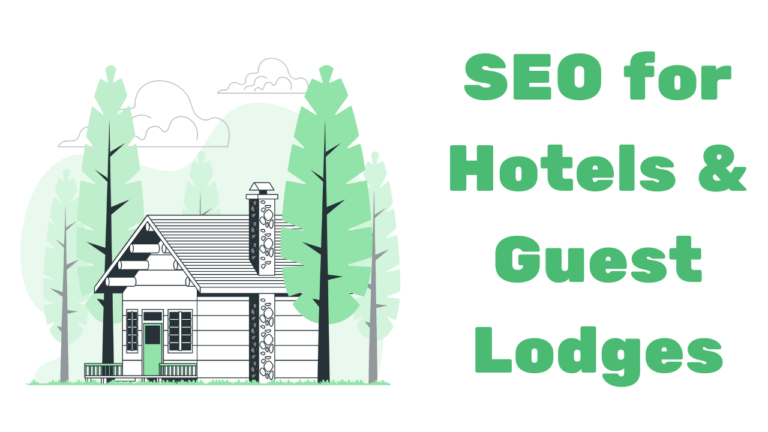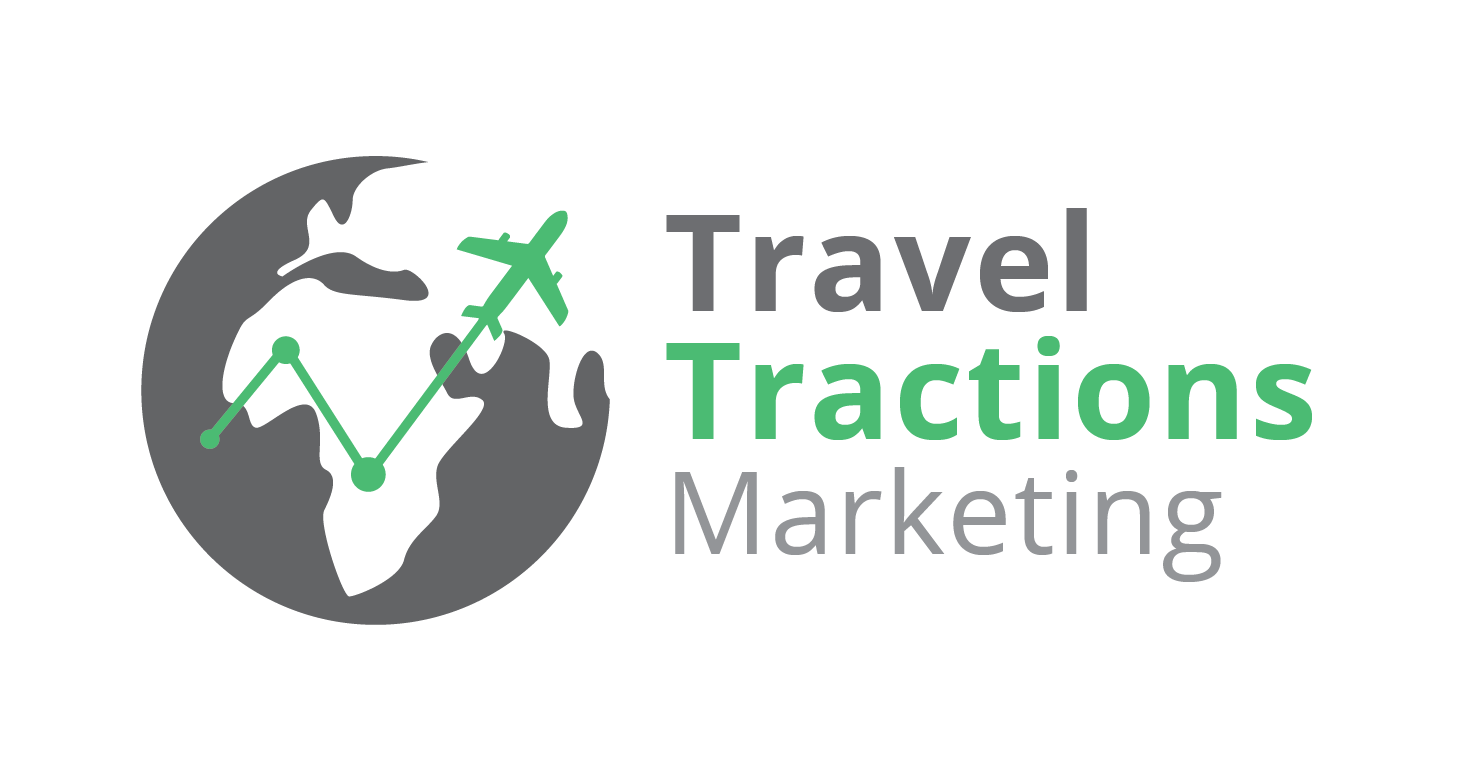
SEO for Hotels & Guest Lodges | Strategy for Hospitality Businesses
If you’re searching for SEO for hotels, then you want to know how to increase traffic to your hotel website. When it comes to selling your hotel as a destination, you have to use targeted marketing tactics in order to be successful.
And one of the best ways to ensure long-term success for your hotel is to not only provide a great experience for your guests but to invest in your SEO so you can rank organically in Google search results.
If you want to learn everything there is to know about hotel search engine optimization, then you’ve come to the right place. This is your one-stop guide to hotel SEO strategy. Implement these tactics effectively, and you’ll be ranking organically on search engine results pages and increasing the traffic to your hotel website.
What is Hotels SEO?
 SEO for guest lodges and hotels is the act of optimizing your website in a way that makes understanding them easier for search engines. You want your website to be both understood and viewed as quality content by search engines as this means they will rank you well in search results.
SEO for guest lodges and hotels is the act of optimizing your website in a way that makes understanding them easier for search engines. You want your website to be both understood and viewed as quality content by search engines as this means they will rank you well in search results.
Most search engine optimizers like to focus on Google, as it is the most widely used search engine around the world. As of June 2022, Google dominates 91.88% of the search engine market, so it only makes sense to focus on ranking in Google as opposed to other search engines (although many of the tactics used are the same across all search engines).
Why is Hotel SEO Important?
SEO is important because it drives traffic to your website without the use of paid advertising. This, in turn, strengthens your online presence and increases the bookings made through your website. And ultimately, increasing your bookings should be one of your main goals, as this is what brings revenue to your business.
Your Complete Guide to SEO for Hotel Industry Businesses
 Hotel search engine marketing can take your business to the next level of success. Whether you’re a hotel or guest lodge that’s just starting out or you’ve been in the industry for a while, SEO can help you. This is your complete guide to SEO for hotel websites.
Hotel search engine marketing can take your business to the next level of success. Whether you’re a hotel or guest lodge that’s just starting out or you’ve been in the industry for a while, SEO can help you. This is your complete guide to SEO for hotel websites.
Outline Your Target Audience
Before you start your journey in the online marketing space, you need to figure out who your target audience really is. Your target audience is the type of person that you would ideally like to stay at your hotel or guest lodge and that would also love to come to stay at your hotel.
Build a customer persona
In order to make sure that you are marketing toward the right audience will all of the content that you put out, you should create a customer persona. This is a persona that you create to embody the attributes that you feel your target audience portrays.
When creating your customer persona, include the following elements:
- Name
- Age
- Interests
- Likes
- Dislikes
- Location
- Behavioural traits
- Pain points
- Buy patterns
- Portfolio photo
Once you have created your customer persona, make sure that all content you create is geared toward satisfying a need or want or is entertaining and of interest to this specific persona.
Do Keyword Research
 Whether it be for a piece of content or for your website in general, it is important that keyword research is at the basis of any web content created. This way, your content has a clear purpose – to satisfy a specific query that your audience may have.
Whether it be for a piece of content or for your website in general, it is important that keyword research is at the basis of any web content created. This way, your content has a clear purpose – to satisfy a specific query that your audience may have.
Aim to rank for long-tail keywords
Long-tail keywords are important for two reasons:
- They are easier to rank for than shorter keywords because fewer people are writing about them. And therefore you have less competition.
- The content that you create around long-tail keywords is more likely to satisfy user intent because the user has searched for something very specific, so you know exactly what they are looking for.
An example of a long-tail keyword would be “things to do in Cape Town in winter” or “things to do in Cape Town for couples”, as opposed to “things to do in Cape Town”, which is a shorter and less specific keyword.
Create content clusters
 When creating blog content for your website (which you should do on a regular basis to keep your website up to date), it’s best to write in content clusters. Pick a specific topic, and write about the topic as well as all the sub-topics related to the main topic until you have covered that area of content in its entirety.
When creating blog content for your website (which you should do on a regular basis to keep your website up to date), it’s best to write in content clusters. Pick a specific topic, and write about the topic as well as all the sub-topics related to the main topic until you have covered that area of content in its entirety.
An example of this would be deciding to write content about things to do in the area surrounding your hotel. For example, let’s say you have a hotel in Cape Town. These would be some topics that you could cover in the ‘things to do’ cluster:
- Things to do in Cape Town in winter
- Things to do in Cape Town in summer
- Things to do in Cape Town in spring
- Things to do in Cape Town in autumn
- Things to do in Cape Town for couples
- Things to do in Cape Town alone
 You could even go a little more granular with your topic and target the neighbourhood in which your hotel is located in Cape Town. For instance, if your hotel is in the Waterfront in Cape Town, then you could target all the above keywords twice, once with the word Cape Town and a second time with the word Waterfront.
You could even go a little more granular with your topic and target the neighbourhood in which your hotel is located in Cape Town. For instance, if your hotel is in the Waterfront in Cape Town, then you could target all the above keywords twice, once with the word Cape Town and a second time with the word Waterfront.
Before going ahead with these blog posts, though, it’s important to do keyword research to ensure that people are actually searching for these topics. There is no point in writing content that nobody is looking for, so use a keyword research tool such as Ahrefs or KeySearch in order to find data to support your content.
Use keywords in headings and sub-headings
If you’re unfamiliar with how to implement keywords in your content then here is a brief overview. Once you have a list of keywords and sub-keywords for a specific post, you can start writing.
Use the keyword with the most search volume that is easiest to rank for in the main heading of the page (the H1). Try to use the other supporting keywords in H2s and H3s throughout the post, as well as sprinkling them throughout the content.
Engage in Content Marketing
 Content marketing is the act of creating valuable information and content for readers. The main goal of this content is to provide relevant and helpful information that will assist potential customers in their buyer journey rather than pushing them to make a booking.
Content marketing is the act of creating valuable information and content for readers. The main goal of this content is to provide relevant and helpful information that will assist potential customers in their buyer journey rather than pushing them to make a booking.
How does this help? Providing content that is of benefit to the customer but doesn’t immediately benefit the business is a way to build both trust and loyalty with your potential customer base.
Content marketing is also an effective way to drive large amounts of traffic to your website. If you create highly researched and valuable content based on keyword research that is relevant to your niche, you can rank well in search engines and gain organic visitors to your website.
Let SEO Inform the Technical Aspects of Each Page
 While technical SEO can get rather complex, we are going to deal with the most basic of technicalities. Your page title, meta description, and URL should all be based on SEO data.
While technical SEO can get rather complex, we are going to deal with the most basic of technicalities. Your page title, meta description, and URL should all be based on SEO data.
Page title
Your page title is the title that appears in the tab, but it is more important than this. It also informs search engines (along with many other factors) what the page is actually about.
It’s important that your main target keyword is present in the title. It’s also crucial that no two pages contain the same title because this confuses search engines, and they won’t be sure which one to rank in SERPs.
Meta description
 Your meta description is the text that appears in SERPs under the H1 of your page or post. It tells the users a little more about what they can expect to learn, see or encounter if they click on your page or post. When writing your meta description, be sure to include your target keyword.
Your meta description is the text that appears in SERPs under the H1 of your page or post. It tells the users a little more about what they can expect to learn, see or encounter if they click on your page or post. When writing your meta description, be sure to include your target keyword.
It’s important that you stick to the 155 – 160 character length suggested by Google, as anything longer than this will be cut off in SERPs.
URL
The URL of the page or post is important because this also works to tell search engines what they can expect from the page. Your URL should be short and concise, containing ONLY the main keyword for the post.
It also shouldn’t contain stop words (e.g. a, the, is, are, etc.) or numbers. Here is an example of what a URL should look like for a post about “things to do in Cape Town in winter” – www.exampledomain.com/things-to-do-cape-town-winter/.
Audit Existing Content
 If you want to run a successful marketing strategy, then an important part of it will be monitoring how your already existing content is performing. The best way to do this is by tracking your website content with Google Search Console and Google Analytics, but more on that later!
If you want to run a successful marketing strategy, then an important part of it will be monitoring how your already existing content is performing. The best way to do this is by tracking your website content with Google Search Console and Google Analytics, but more on that later!
Only analyse content that has been on your website for six months or more because this has had a chance to rank and be tested in SERPs. You should be looking for content to do the following:
- Optimise – posts that are ideal for optimization are ones that are consistently ranking at the bottom of the first results page in Google SERPs (position 5 – 10) for their top ten keywords. These could benefit from optimization because adding additional keywords, content, and building links to these pages could push it into the top three and increase its ability to bring traffic to your website.
- Delete – posts that should be deleted are ones that haven’t received any clicks (or have only received one or two clicks) in the past six months. These have little to no chance of ranking or are about a topic that nobody is searching for. Before deleting these pages, check to see if they have links to them from other websites. If they do, it is better to redirect these posts because you don’t want to lose a valuable backlink.
- Redirect – posts that are ideal for redirection are exactly the same as the ones that should be deleted, but these have backlinks. When redirecting, look for another page or post that is super relevant to the topic written about in the post that is going to be redirected, and redirect to this relevant page. This way, the link is still highly relevant.
 You may be asking yourself why deleting and redirecting content would be helpful for your hotel website. Well, content pruning has proven to be highly effective in content marketing. If you delete content that doesn’t have a chance to rank, then search engine crawlers spend more time crawling the higher quality content, and it could improve your rankings on other pages or posts.
You may be asking yourself why deleting and redirecting content would be helpful for your hotel website. Well, content pruning has proven to be highly effective in content marketing. If you delete content that doesn’t have a chance to rank, then search engine crawlers spend more time crawling the higher quality content, and it could improve your rankings on other pages or posts.
How to optimise a post
While optimizations are another aspect of SEO that can get rather complicated, we will stick to the basics.
Go through the queries that the posts are already ranking for (this can be seen in Google Search Console). You’ll then want to go through the post and make sure that all of the queries the post is already ranking for (and are relevant to the content) are in the post.
Next, you’ll want to look at competing posts to gauge what word count you should be aiming for. Open “incognito mode” on your web browser (so that your location does not affect search results). And type in the main keyword for the post you are trying to rank.
Open the top three search results and assess their word count. Once you have looked at all three, find an average of the top three and set out to get your word count as close to that average as possible.
Optimise Your Images
 The images that are added to your website matter for so many reasons. Customers shop with their eyes, and the more visually pleasing your images are, the more likely you are to make a sale. But these images ALSO make a difference in the SEO of your site.
The images that are added to your website matter for so many reasons. Customers shop with their eyes, and the more visually pleasing your images are, the more likely you are to make a sale. But these images ALSO make a difference in the SEO of your site.
Travel is a very visual niche, so people want to see images every 100 – 200 words, so ensure your pages and posts are image heavy. But because people want to see images, search engines now also prioritise posts that are image heavy in the travel niche.
Image size
Be careful with your images because adding large photos to your website can slow down your site’s loading speed quite significantly.
How do you counter these loading issues before they’ve even occurred? Use a tool like Image Compressor to decrease the size of your images before uploading them.
Image alt text
Another way you should be optimising your images is by adding image alt text. This is the text that tells search engines what is contained in the image. This helps search engines to show your images in relevant image searches – which could be yet another way for people to find their way to your website.
Ensure Your Website Loads Efficiently
 Site speed has become a more and more influential ranking factor in Google’s algorithm over recent years because they have started to understand how site speed influences user experience. Apart from site speed being a crucial ranking factor, it also influences how many people will stay on your page.
Site speed has become a more and more influential ranking factor in Google’s algorithm over recent years because they have started to understand how site speed influences user experience. Apart from site speed being a crucial ranking factor, it also influences how many people will stay on your page.
Statistics tell us that if your site takes more than three seconds to load, you are likely to lose 40% of the people who clicked on your link. That is almost half of your potential traffic.
Now that you know just how important site speed is, how can you tell how fast your website is loading? If you use Google’s Pagespeed Insights tool, it will not only give you a score out of 100, but it will also tell you what can be done to improve your page speed.
It’s important to do this with your homepage as well as other important pages and posts on your website. This is because most people that find your website in SERPs won’t be landing on your homepage.
Make Sure Your Website is Mobile-Friendly
 As of August 2022, mobile makes up 62.06% of web traffic. That’s more than half of all the people browsing the internet. So it’s clear that your website needs to be optimised for mobile use.
As of August 2022, mobile makes up 62.06% of web traffic. That’s more than half of all the people browsing the internet. So it’s clear that your website needs to be optimised for mobile use.
You can check whether or not your website is mobile-friendly by manually accessing your website on your phone or mobile device. Try to navigate your hotel website as a user would and attempt to make a booking. If you have any trouble along the way, then you know that the mobile usability of your website could be improved.
You can also use Google’s very own mobile-friendly tester to find out if there is anything that could be improved for mobile users. Considering they make up more than half of web traffic these days, this is crucial to the success of your online hotel marketing.
Create a Google My Business Account
Google My Business is what users see when they search for your business (if you have a Google My Business account set up). See the example of the Travel Tractions Google My Business below.
The information contained in your Google My Business is used for more than just when users search for your hotel directly. Google uses this data for Google Hotel Search, so it’s important to optimise your GMB properly so that it shows up in as many relevant searches as possible. Here is what needs to be added to an effective GMB account:
- Ensure that the name of your hotel, the address, and the phone number have all been filled out correctly. If you allow people to contact you via email, that should be added too.
- Make sure that the Google Maps marker is pointing to the correct location (so that users can see exactly where you are located and use their Google Maps to navigate to your hotel easily).
- Add all additional information about your hotel that would be relevant to those who might be searching for you, e.g. disabled access, WiFi, smoking area, restaurants, child care, etc.
- If you have multiple hotels in your hotel group, then you should create a listing for each one, but they can all be contained within the same account.
- Verify your GMB.
Build Links to Your Website
 If you want search engines to start trusting your hotel website, then you need to show them that you are an authoritative source of information. One of the most effective ways to do this is to build links to your website.
If you want search engines to start trusting your hotel website, then you need to show them that you are an authoritative source of information. One of the most effective ways to do this is to build links to your website.
This can be a challenging thing to do and may require some networking. You can reach out to local online newspapers, magazines, or travel blogs, asking if they would link to your website from one of their articles.
This is easy if they already have a post that mentions your hotel. They may request a small fee, or you could offer to write a post about your hotel for free, which they could post on their website (online publishers find it hard to turn down free quality content).
You could also join a Facebook group for travel bloggers, such as this one, that allows you to network with travel bloggers and engage in link swaps. This means they can link to you, and you can link to them.
It’s also important to build profile links on websites, showing that your hotel group has set up accounts on social media platforms and other networking groups. You can do this simply by setting up an account and adding a link to your website in the bio. These also act as a sign of authority to Google crawlers.
Anchor text
 Anchor text is the words you use that link back to your site. For instance, the anchor text in the previous sentence was the phrase “anchor text”. It’s important because it can be an indication to Google crawlers and readers of what information can be found when we click on the link.
Anchor text is the words you use that link back to your site. For instance, the anchor text in the previous sentence was the phrase “anchor text”. It’s important because it can be an indication to Google crawlers and readers of what information can be found when we click on the link.
In general, we like to use targeted anchor text that tells us exactly what can be found if we click on the link. But when you are engaging in link building, you don’t want to use the same anchor text more than once or twice. This is because it could be a red flag to Google that unnatural link building is taking place.
Therefore, we like to use a wide spread of different anchors such as the following:
- Keyword-rich anchors – anchor text that contains the target keyword for the page we are linking to.
- Naked anchors – the URL of the page we are linking to.
- Branded anchors – the name of your hotel or hotel group.
- Generic anchors – phrases such as click here, learn more, and book now.
Link building is something that requires a lot of strategy and patience, so if you’d prefer to leave it to the experts with all of the right connections in our back pockets, we’d be happy to help!
Optimise For E.A.T (Expertise, Authority, and Trustworthiness)
 Google’s most recent updates have all been to favour websites that show expertise, authority, and trustworthiness. What does this mean? It means that it’s time to show off a little. Google wants to see that you are an authority in your niche, and it’s good for users to see this as well.
Google’s most recent updates have all been to favour websites that show expertise, authority, and trustworthiness. What does this mean? It means that it’s time to show off a little. Google wants to see that you are an authority in your niche, and it’s good for users to see this as well.
To demonstrate your expertise, you should make it clear on your website who on your team is an expert and why. For example, do you have a Michelin Star chef? Be sure to let people know with a little blurb about your chef. Do your hospitality staff have certificates of qualification from some institution? List them on your website. Have you had success with a previous hotel? Let people know!
 To demonstrate your authority in your niche, create content about the area in which your hotel is situated. Let your audience know that you can really help them with their travels by providing all of the information that they need. This kills two birds with one stone because having content is great for your search engine marketing strategy, but it demonstrates your authority too.
To demonstrate your authority in your niche, create content about the area in which your hotel is situated. Let your audience know that you can really help them with their travels by providing all of the information that they need. This kills two birds with one stone because having content is great for your search engine marketing strategy, but it demonstrates your authority too.
And last but not least, trustworthiness can be displayed in many different ways. If clients have left rave reviews about their stay at your hotel, display them on your website. There’s nothing that makes someone trust a hotel more than social proof (someone else having a wonderful stay).
Make sure that your privacy policy and terms and conditions pages are visible on your website so that users and Google crawlers can see that you are being transparent. This will have search engines and humans trusting you in no time.
Take Advantage of Voice Search
 In 2022, 27% of people are using voice search on their mobile devices. This number is only predicted to grow as the software becomes more and more refined. What does this mean for SEO? It means that we need to adapt and optimise our pages for voice search to future-proof your hotel SEO.
In 2022, 27% of people are using voice search on their mobile devices. This number is only predicted to grow as the software becomes more and more refined. What does this mean for SEO? It means that we need to adapt and optimise our pages for voice search to future-proof your hotel SEO.
In order to optimise your hotel website for voice search, you need to make sure you are using informal phrases; one’s that people would use in conversation rather than typing out. This could be as simple as optimising a post for “what to do in Cape Town” as opposed to “things to do in Cape Town”.
You can also optimise your posts for both typed searches and voice searches by including both keywords prominently in your post. This is highly recommended as the majority of searches are still taking place via typed searches, so we don’t need to get ahead of ourselves just yet.
It’s just good to be mindful of the way the search is going so that we are prepared and making steps toward ranking in the future.
Implement Local SEO
 Local SEO is important if you want to show up in local searches such as “hotels near me”. One of the ways that you can do this is by adding your city name to your content. This was outlined in our keyword section but writing posts like “things to do in Cape Town” rather than “things to do near x hotel” is better for SEO.
Local SEO is important if you want to show up in local searches such as “hotels near me”. One of the ways that you can do this is by adding your city name to your content. This was outlined in our keyword section but writing posts like “things to do in Cape Town” rather than “things to do near x hotel” is better for SEO.
It helps Google to understand exactly where your hotel is located and improves the likelihood of showing up in searches when people search for “hotels in Cape Town”.
Another way you can do this is by adding your location information, and a map on your website. This further bolsters and verifies your GMB account. The more information you can add to both your site and your GMB account, the better. Consider including the following:
- Driving directions
- Hours of operation
- Reviews
- Payment options
- Description of hotel
- Images
- Videos
The more information there is for Google to work with, the more you will start appearing in relevant searches. This information is also incredibly useful for your potential customers. The more they know before their visit, the easier their trip will be.
Prosper on Google Hotel Search
 Google Hotel Search was upgraded in 2015 with a new interface that favoured hotels with larger images and bigger fonts for their hotel descriptions. These results show up when people search for things such as “hotels in Cape Town” or “hotel in Waterfront, Cape Town”.
Google Hotel Search was upgraded in 2015 with a new interface that favoured hotels with larger images and bigger fonts for their hotel descriptions. These results show up when people search for things such as “hotels in Cape Town” or “hotel in Waterfront, Cape Town”.
You should aim to get your hotel to the top of these listings, although this is not always easy. Here are some things you can do to improve your rankings in Google Hotel Search:
- List HD-quality photos on your GMB – this will aid in increasing your clicks as well as your conversations.
- Provide as much useful information as possible and list the amenities available for use.
- Encourage your guests to leave positive reviews for your hotel – you can do this by incentivizing them with a discount on their next stay or a free meal along with their next stay.
These factors can help your listing climb in rankings and eventually be one of the first listings people see when searching for a hotel in your area.
Use Tools to Track Website Performance
 It’s important to track the performance of your hotel website so that you know when your strategy needs to be tweaked. You will also be able to see when your strategy is working, which can provide some much-needed encouragement for your marketing team.
It’s important to track the performance of your hotel website so that you know when your strategy needs to be tweaked. You will also be able to see when your strategy is working, which can provide some much-needed encouragement for your marketing team.
The best tools to use for site tracking are Google’s own tracking tools:
- Google Search Console – allows you to check the indexing status of your pages and see which queries (or keywords) you are showing up for in Google SERPs.
- Google Analytics – collects data from your website to see your main traffic sources and learn more about the users accessing your website.
Monitoring these closely will provide you with valuable insights into the way users are interacting with your website and how they are coming across your website.
If you want to get a little more granular with your tracking, you can use heat mapping software that allows you to track the movements of users on your website. This means you can easily see where users are spending the most time and where you are losing the majority of your audience. You can then use this information to improve your user experience and keep people on your website for longer – leading to more conversions.
Invest in Hotel PPC
 Pay-per-click advertising for hotels is an effective way to get your hotel to the top of search engine results with immediate effect. It can be incredibly effective, but the only drawback is that when you stop paying for PPC advertising, your rankings disappear.
Pay-per-click advertising for hotels is an effective way to get your hotel to the top of search engine results with immediate effect. It can be incredibly effective, but the only drawback is that when you stop paying for PPC advertising, your rankings disappear.
If you choose to use PPC, it’s best to work on SEO in the background so that when you stop paying for PPC, your site will still be ranking fairly well. Ensure that your PPC ads are optimised correctly to get the best results, if you get stuck you can read more about PPC for hotels.
Wrapping Up SEO Strategy for Hotels
 SEO for hotels can seem like a complicated business, but when you break it down, it’s many simple parts of a puzzle that fit together to make a holistic SEO strategy. Many of the tactics outlined in this post overlap, meaning that optimising your GMB can improve your appearance in Google Hotel Search as well as improve your local SEO.
SEO for hotels can seem like a complicated business, but when you break it down, it’s many simple parts of a puzzle that fit together to make a holistic SEO strategy. Many of the tactics outlined in this post overlap, meaning that optimising your GMB can improve your appearance in Google Hotel Search as well as improve your local SEO.
Much the same way content marketing improves your SEO rankings AND works as a sign of expertise in your niche. Don’t be intimidated by the amount that needs to be done in order to rank your hotel in SERPs because you can start with one or two of these suggestions and increase as your bookings increase.
If you would prefer to leave the SEO up to the professionals, then we’d be happy to help. We have helped countless hotel websites improve their SEO and conversions. Find out all the strategy tricks we have up our sleeves by booking a call with us. We look forward to working with you to make your hotel website a success!



